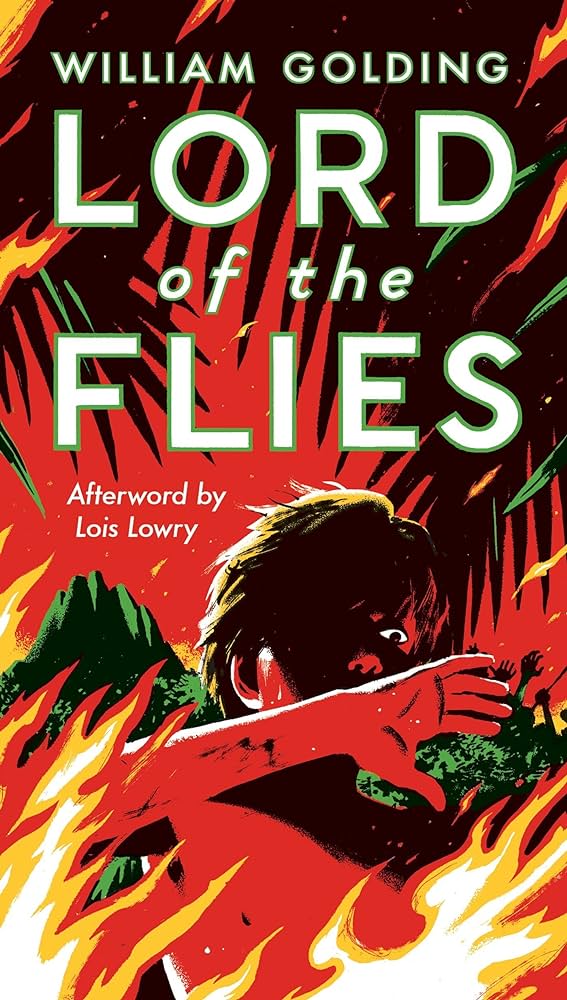
I spent a short time working as a high school math teacher. While I was teaching, I noticed that a number of students had this book. It was required reading for a literature class. Many of the students seemed to have pretty strong opinions on the book and the eerie cover caught my attention. I remember reading the first dozen or so pages back then. It seemed interesting, but then I forgot about it. Fast-forward many years. I am trying to find something to read and I suddenly remember it. I love older books like these. They are well-vetted, so they are almost always a good read, and they are always plentiful and cheap. I think I paid a few dollars for it. The author, William Golding was a Nobel laureate. He was also a veteran of WWII. During the war he was witness to the many atrocities of man. This book takes place shortly after this war.
I believe this book projects much of what Golding saw in the worst of human nature onto a group of young boys who are left to fend for themselves after a plane crash on an uninhabited island. The book starts a short time after the crash with a group of boys ranging in age from very young, perhaps five years old, to early teens scattered throughout the dense vegetation of the island. One of the older boys, Ralph, makes his way to a clearing by a beach and, using a found conch shell, blows on it to signal everyone to gather together. Slowly, the kids follow the sound to the beach, each emerging from different parts of the vegetation. Things are very orderly initially. They chose Ralph as their chief and he assigns everyone roles to build shelters, gather wood, and find food. Not long after, people slowly begin to shirk responsibility. Ralph believes, rightly so, that a fire should be maintained so that they have some chance of a passing ship finding them by seeing the smoke from what should be an uninhabited island. They begin tending the fire in shifts, but oftentimes a shift falls asleep and the fire goes out.
They build shelters, but many in the group take off to play in the water instead of work. There is also another older boy, Jack, who has taken up hunting. Jack’s hunting is initially a good thing as he becomes adept at killing the wild pigs on the island and providing meat for the group. As time goes on, however, hunting is all Jack cares about. He forgoes all other tasks and eventually sees his hunting skills as being so valuable that he should be chief. This creates a power war between himself and Ralph. Ralph is not a perfect leader, but he thinks about the well-being of the group and realizes that the fire is the key to a chance of being rescued. Jack thinks only of hunting and being in charge. As the group slowly slips into two factions. Jack’s group becomes blood-thirsty savages, while Ralph’s group dwindles down to the very young boys and a corpulent, but intelligent older boy nicknamed “Piggy”. In the end Jack turns many of the boys into scared soldiers. He uses intimidation, beatings, and torture to control his group. Eventually, when Ralph’s group is at its weakest, Jack’s group begins to steal from Ralph’s group and attack them in their sleep. Ralph tries to reason with Jack as he is amenable to sharing resources. The most important being fire and Piggy’s glasses, which are used to start fires. There isn’t a reason to steal, but Jack wants to steal and impose himself on the others. In the end two of the boys, Piggy and Simon, end up getting killed through Jack’s actions and has the remaining boys “hunting” Ralph.
In an effort to drive the hiding Ralph out of thick foliage, Jack and his crew ignite the entire island. Fortunately for Ralph, who appeared to have been flushed out and nearing his end, the fire has caught the attention of a passing military vessel whose crew arrives just in time to save Ralph.
The book is very well-written, as would be expected from a Nobel laureate in literature, and outside of a few phrases, is not really dated. This book would not be much different if adapted to present-day. I did find the last couple of chapters to be pretty gruesome. To me, it is borderline inappropriate to mandate its reading for high school students. It does paint a fairly grim picture of the bad side of human nature, but what probably makes it gruesome is the fact that you believe that the behaviors portrayed are quite plausible for a group of people. It only takes one person with a greedy heart and a little power to destroy a large group. Jack does not start out malevolent, but as he gains power and becomes drunk in his killing for thrill, he loses all morals. This book is a very interesting study in human nature.

